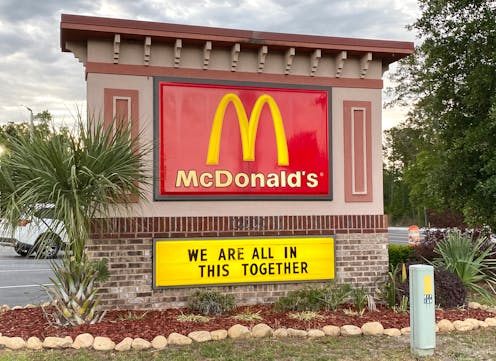how companies used COVID as a marketing tool
- Written by Maha Rafi Atal, Lecturer in Global Economy, School of Social and Political Sciences, University of Glasgow, University of Glasgow

At the start of the pandemic, consumers were bombarded with a new and hastily constructed form of advertising. In those “uncertain times”, customers were promised, they could rely on their favourite brands for help.
The adverts, often featuring[1] sombre piano music and declarations that everyone was “in this together”, were ubiquitous[2]. Now our research[3] reveals the tactics behind these adverts, and why consumers should be wary of marketing in a crisis.
When COVID was still new and confusing, when governments were unsure about how to respond, corporate advertising sought to define the pandemic in ways that made companies – and their products – an essential part of whatever the solution might turn out to be. We found that from mid-March to the end of April 2020, companies used advertising to tell three main types of story about COVID.
Some, like the global shipping giant Maersk, emphasised the supply chain impact of the pandemic and pointed to their role helping to get essential equipment to the right places. This kind of marketing defined COVID as a crisis of logistics – a problem for which corporate managers could argue they have the most specialist expertise.
Others, especially consumer goods brands like Starbucks, concentrated on the financial side of the situation, and their role in donating food or money to those in sudden need. This kind of marketing defined COVID as a crisis of capital. If the problem is not enough cash, then wealthy corporations can swoop in as heroes by freeing some up quickly.
Then there were those, especially fashion and luxury brands, which focused on the emotional impact of the pandemic, and pointed to their products as ways to make the experience easier and even fun. These adverts made the case that personal consumption – shopping from your lockdown – could be a form of humanitarian heroism, with you as the grateful recipient, or a way of taking care[4] of yourself.
But there were risks attached to these messages, and not all of them landed well. Some ads seemed oblivious to the wider social problems that were making the crisis harder for some to bear.
Fashion advertisements targeted at women which described the pandemic as a kind of “staycation[5]” for example, sat uncomfortably next to news reports[6] about women who were leaving the workforce under the crushing burden of childcare and housework.
E-cigarette advertisements encouraging consumers to take up vaping “for your health” invited a backlash[7] when hospitals were filled with COVID patients on ventilators.
Some companies even provoked consumers[8] by mocking the severity of the pandemic, including an Italian ski resort which invited[9] travellers to “experience the mountain with full lungs” in a place “where feeling great is contagious”. Elsewhere, social media companies struggled to stamp out misinformation[10] from “influencers” hired by wellness brands to promote untested products as COVID-19 cures.
Even adverts which took the pandemic seriously found themselves on shaky ground.
When the UK was coming out of its first lockdown, the cleaning brand Dettol went viral[11] (in the wrong way) when it appeared to be encouraging commuters to return to the office. Some consumers conflated the ads with government public service announcements promoting shopping as a way of boosting the economy.
The misconception contained a grain of truth, as Dettol was the government’s corporate partner[12] for sanitising public transport. Indeed, several brands in our research mentioned partnerships with government as one of the benefits of the crisis. Meanwhile, advertisements encouraging consumers to shop[13] to “help” rebuild the economy (and companies in it) have proliferated[14].
Advertising which addresses social concerns is common, not just in relation to COVID, but to a range of causes where consumers are primed to see corporate solutions for everything from poverty[15] to climate change[16].
Our research shows such advertising is frequently designed to influence how the public understands social problems, and encourages people to think of ethical consumption as a way of helping[17].
As others have argued[18], such marketing related to good causes “creates the appearance of giving back, disguising the fact that it is already based in taking away”. Consumers can be deterred from campaigning for more radical change, believing they have already played their part through “ethical” purchasing.
One familiar example is when companies boast that a percentage of proceeds from certain products goes to a social cause. The amount donated is often small [19] while the revenue the new product generates for the company is considerable.
As another commentator has put it[20]: “If we insist that this is the only way to effectively address massive social problems, we resign ourselves to a world dictated by consumer impulses”.
The risks then, of attaching a social issue to an advertising campaign, are considerable – for the company, the consumer, and the cause itself. Our research suggests that not every time is the right time for advertising[21]. We should beware of brands bearing gifts.
References
- ^ often featuring (www.nytimes.com)
- ^ ubiquitous (www.coca-colacompany.com)
- ^ our research (www.tandfonline.com)
- ^ taking care (www.prweek.com)
- ^ staycation (milled.com)
- ^ news reports (www.marketplace.org)
- ^ invited a backlash (www.prweek.com)
- ^ provoked consumers (www.testisumisura.com)
- ^ invited (www.testisumisura.com)
- ^ stamp out misinformation (www.wired.com)
- ^ went viral (www.campaignlive.co.uk)
- ^ government’s corporate partner (www.standard.co.uk)
- ^ encouraging consumers to shop (www.campaignlive.co.uk)
- ^ have proliferated (digitalagencynetwork.com)
- ^ poverty (press.princeton.edu)
- ^ climate change (www.globalwitness.org)
- ^ way of helping (www.commodifyingcompassion.com)
- ^ have argued (journals.sagepub.com)
- ^ amount donated is often small (www.thirdsector.co.uk)
- ^ has put it (www.theatlantic.com)
- ^ right time for advertising (www.cbds.center)







